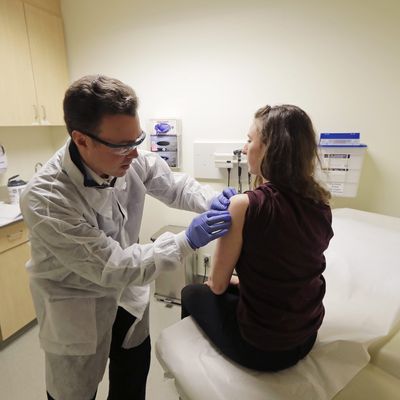
On January 13, less than a week after COVID-19 was identified as the virus behind the outbreak in Wuhan, researchers at Cambridge-based biotech company Moderna proposed a vaccine to fight it. A little over two months later, on Monday morning, a pharmacist in Seattle injected Rebecca Sirull with that vaccine, making her the third person to be injected in a 45-person clinical trial, the first human trial in the country. To rush the vaccine to clinical trial, Moderna skipped animal testing, a somewhat extraordinary measure. Sirull, a healthy 25-year-old editorial coordinator at a research institute, will receive a second injection in a month and have her blood drawn regularly for more than a year. Should the test be successful, the more optimistic estimates suggest that a vaccine could be available in 12 to 18 months. Intelligencer spoke with Sirull about her decision to take part.
How did you hear about the trial?
I got a letter in the mail about a month ago saying they were putting together a registry for people who might potentially be interested if they were to go ahead with the trial. It said “email this address and we’ll add you to our list.” So I sent them a message just because I thought it was interesting and wanted to hear more and I got a call that same day or the day after that they were going ahead with the trial.
Why did you ultimately decide to participate?
I signed the consent last week. At that point the news around coronavirus, and the policies around it, had escalated a lot. Initially, when I answered the letter last month, it was just a curiosity. By last week, when I could choose yes or no, I realized this situation is actually pretty dire and it’s a really important thing to be a part of.
Did you discuss it with anyone beforehand?
I didn’t tell anyone until I’d actually decided to do it. I told my parents and a couple of friends after I signed up and it was set in stone that I would be doing it.
What happened on Monday?
I got to the clinic at 8 a.m. They have you fill out a questionnaire — it was the third time that we filled that out. It asked if you were feeling any symptoms of the flu or virus; if any of our behaviors have changed that would not allow us to be in the study. We did a drug test, a pregnancy test, a few different blood-draw tests for other things to make sure that we were still eligible. Then the pharmacist came in and gave the injection. The whole thing happened in 30 seconds or less, quick and painless. They sent us home with a form to fill out and a thermometer to record our temperature daily. They call every day to make sure we’re doing ok. I’ll go back for a follow-up visit on Monday.
What did they tell you about the vaccine?
They’ve been very transparent and open to answering any questions that I have. What they told us is that it’s not a live virus. We don’t actually get exposed to the coronavirus itself. The vaccine is made out of a messenger RNA sequence that teaches your body to produce a protein with a similar shape to the coronavirus and then they check and see if you’re able to produce antibodies that would be able to fight that protein if it were to come in contact with it in the future.
Did they give you any indication about the probability of this vaccine working?
I think they’re very hopeful, but I haven’t gotten a lot of detail about the exact percentages or probability that it will work.
You’re working from home in Seattle, under self-quarantine. It seems sort of counterintuitive to put someone who is testing a vaccine into self-quarantine and not coming in contact with the virus.
The test is not whether or not I get coronavirus. They do that with some types of vaccines, but for this one, the way they’re testing is by drawing my blood every week and looking at the number of antibodies that are in it. That’s what fights off the infection. If my body starts producing more antibodies, then they’ll know that it’s effective. So, the goal is not to give me the coronavirus.
Aha, I’m glad that’s not the goal, for your sake.
Pretty neat …
Did they mention any potential side effects?
It’s not a live virus, so most of the risks that they discussed have to do more with the site of injection itself (like redness or swelling). I’m monitoring myself for fever, cough, nausea, headache. All of the symptoms of the virus.
Did they tell you anything about how the vaccine was developed?
They didn’t do animal testing, which is usually part of vaccine trials. That step was skipped. That’s because they have made other vaccines that use this same technique as opposed to a live virus. Those other types of vaccines were shown to be either successful or not have huge risks to the participants. I believe that’s why they skipped the animal portion, since they had already done a similar concept for the flu. They had been experimenting using that same mRNA sequence, as opposed to live virus. It’s just applying that same theory to a new shape.
What is Seattle like right now?
It’s interesting. I live in a residential area. Most people are working from home. The kids are out of school. There are a lot of people out walking their dogs or going for bike rides or jogs, but maintaining that distance. The weather is starting to get really nice, so people are outside doing yard work, doing home maintenance projects. Whereas going downtown, or places with a lot of bars and restaurants, are total ghost towns.
What are you doing to cope?
I’ve put together a little checklist for myself. Change the lightbulbs, frame posters for the wall, plant some seeds for the yard, and I have some soup recipes I’ve been meaning to try out.
Living in Seattle, do you know anybody who has the virus?
No one that I know personally. But I work at the University of Washington at one of the research centers and I know a professor there recently passed away from it, which was really sad. I didn’t know him but a lot of colleagues did.
We’re committed to keeping our readers informed.
We’ve removed our paywall from essential coronavirus news stories. Become a subscriber to support our journalists. Subscribe now.






























